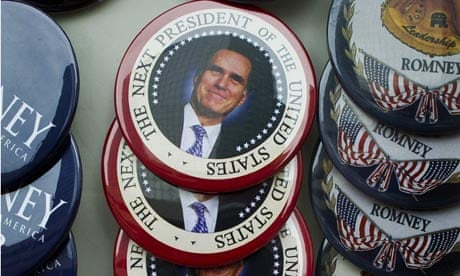Just how screwed is the Republican party electorally? We all know Mitt Romney lost by nearly 4 points, and the Republican party has won the national vote for president only once since 1992. That's likely why there's a lot of pressure for Republicans to pass immigration reform to "get with the times" and not lose the growing Latino vote for a generation. I, however, continue to think the idea that Republicans have to adjust to win national elections is hogwash.
Why do I say such a thing?
1. Voters thought Mitt Romney was actually closer to them ideologically
John Sides put together this graph from a bunch of surveys taken during the 2012 campaign.
Voters were asked where they put themselves ideologically and then to place each of the candidates on the same ideological scale. Throughout the campaign, the average voter was closer ideologically to Mitt Romney than to President Obama.
That, of course, doesn't match the hype these days. You could, of course, argue that Mitt Romney was closer to the center than the average Republican politician, but the facts don't really bare it out. His donor base, which can be used to measure ideology since people most often donate to those they line up with on the issues, ended up being right in the middle of those of the last Congress. Same goes with the congressional endorsements he racked up during the primary: they were in the center of the caucus.
Then how the heck did Obama win? Again, it goes back to the fact that ideology doesn't matter much in presidential elections. The economy was doing well enough, so voters rewarded President Obama with another term.
2. In a 2016 presidential matchup, Republicans are performing just fine
There's been a lot of hype around Hillary Clinton's potential 2016 run and rightly so. That said, most understand that her current general election polling numbers won't stand up over time. She's still coming off a height of popularity since serving in the non-partisan position of Secretary of State. As she has reentered the fray, her favorables have fallen off a little and should continue to as they have in the past when she pursues a partisan agenda.
At this point, a better feel of how a Democrat might do if the election were held today is polling involving Vice President Biden. Biden is a well-known standard bearer of the Democratic label. He's been serving in a partisan office for as long as many have been alive. His favorable rating generally matches up with President Obama's approval rating in the polls.
Last month, Biden was either neck-and-neck or trailed leading Republicans. He was 1pt ahead of Marco Rubio and 2pt ahead of Rand Paul in an early May Public Policy Polling survey. He was behind by 4pt against Paul and 6pt behind Jeb Bush in a Quinnipiac poll.
All of them are also less well-known than Biden, yet they are polling at or ahead of him. You could argue that Bush is more moderate than the mainstream Republican candidates, though, Rubio and Paul are almost certainly to the right of it. They incidentally are three of the top four leading contenders for the nomination right now. You wouldn't expect mainstream Republican candidates to be polling this well if the party were too out of the mainstream to win.
3. Republicans have been winning a lot of national elections since 1994
House elections, for better or worse, have turned into national affairs. That's why the presidential vote in each district is so predictive of the outcome in the House races. The good news is the nationalization of the races allow us to get a pretty idea how competitive the parties are.
I don't just mean that we see how many Republicans and Democrats there are at the end of each election; I mean how many votes were won by each party's candidates. This helps to mostly eliminate the effects of urban packing and redistricting.
Since 1994, Republicans have won the national House vote seven times. The Democrats have won it only three times. Republicans have won it in presidential years such as 1996, 2000, and 2004. They won it in 2010 by a large enough margin that even with a presidential year turnout, they still would have taken the House vote by more than 3pt.
If the existence of more extreme Republican candidates was hurting Republicans anywhere, you'd expect it to be in the House given they are furthest to the right. It might not hurt them in seats won, but you'd at least expect it to make a dent in the national vote. Yet, Republicans in the House actually outperform Mitt Romney, winning a higher percentage of the vote.
Overall, the idea that Republicans are somehow too extreme to win elections just doesn't hold much water upon scrutiny. That doesn't mean Republicans can't make moves to update its get-out-the-vote techniques or try and shore up portions of the electorate. Just keep in mind, as Sean Trende notes, moves can be made to win many different groups, not just the ones most mainstream commentators think.
